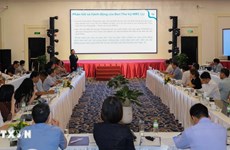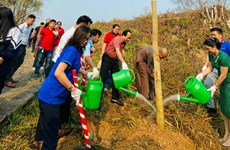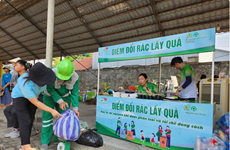WB to prioritise rural sanitation programmes
The World Bank (WB) will continue to prioritise safe water and
environmental sanitation programmes in Vietnam ’s rural areas during
the next decade.
The World Bank (WB) will continue to prioritise safe water and
environmental sanitation programmes in Vietnam ’s rural areas during
the next decade.
This was stated by Dean Cira, WB Senior Urban Specialist, at a seminar on Vietnam ’s strategy on clean water supply and environmental sanitation in rural areas by 2020, held by the Ministry of Agriculture and Rural Development (MARD) in Hanoi on March 23.
WB has supported the national strategy over the past decade and continues to give priority to it in the next decade, to help rural residents gain access to fresh water and sanitary facilities, Dean Cira said.
In the next decade, WB will focus on improving the quality of water as well as the water supply system, he said.
According to Vu Van Thang, Deputy Head of the Irrigation Department under MARD, the decade-old strategy has helped raise the number of rural residents with access to safe water from below 30 percent to 83 percent in 2010, and the proportion of households having sanitary latrines now up to 56 percent.
The strategy to 2020 will focus on poor households and elements to promote sustainable development, matching the country’s socio-economic development strategy by 2020, Thang said.
During the 2011-2015 period, the programme was scheduled to provide fresh water to 95 percent of rural population, of which 70 percent will use water that meets standards set by the Vietnamese Health Ministry, and 85 percent will have sanitary latrines./.
This was stated by Dean Cira, WB Senior Urban Specialist, at a seminar on Vietnam ’s strategy on clean water supply and environmental sanitation in rural areas by 2020, held by the Ministry of Agriculture and Rural Development (MARD) in Hanoi on March 23.
WB has supported the national strategy over the past decade and continues to give priority to it in the next decade, to help rural residents gain access to fresh water and sanitary facilities, Dean Cira said.
In the next decade, WB will focus on improving the quality of water as well as the water supply system, he said.
According to Vu Van Thang, Deputy Head of the Irrigation Department under MARD, the decade-old strategy has helped raise the number of rural residents with access to safe water from below 30 percent to 83 percent in 2010, and the proportion of households having sanitary latrines now up to 56 percent.
The strategy to 2020 will focus on poor households and elements to promote sustainable development, matching the country’s socio-economic development strategy by 2020, Thang said.
During the 2011-2015 period, the programme was scheduled to provide fresh water to 95 percent of rural population, of which 70 percent will use water that meets standards set by the Vietnamese Health Ministry, and 85 percent will have sanitary latrines./.













